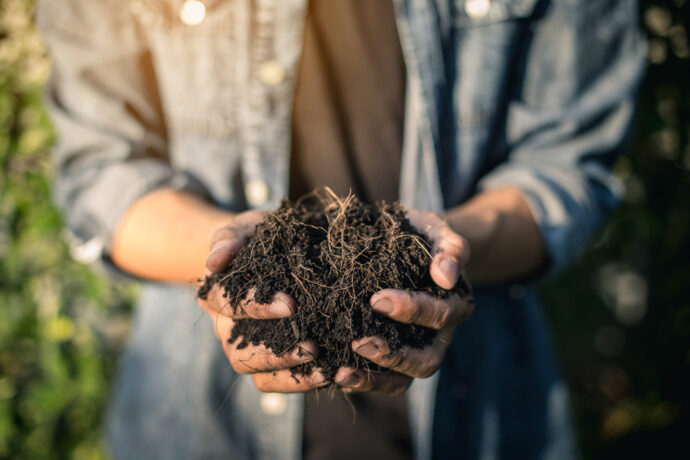The call to care for creation goes all the way back to the garden of Eden. It’s part of the original mandate to nurture the earth and help it flourish—to partner with God in the continued development of creation. Somewhere between the fall and the technological revolution, we began spending more time singing, “I’ll fly away” and significantly less time reciting words like the ones found in Psalms 19 or 148. On the way, our theology of creation care has become as twisted as our sense of identity as children of God. We began thinking we had the freedom to consume as much of the earth’s resources as we wanted without a thought to the quantity of our consumption, the magnitude of our waste, and how those things impact the earth and its people.
Some say that focusing on environmental issues is missing the mark of who we are called to be as evangelists in the world. The truth is that creation care is human care. It is a component of living fully into our identity as Christ followers and co-laborers with the Creator. Jesus cared for the bodies and souls of those around him. He fed and nurtured them, and like a good shepherd, he led them to green pastures—not pastures full of piles of other people’s waste or stripped bare by poor harvesting practices. In fact, some of the people most desperate for the hands and feet of Jesus in the twenty-first century are those suffering under the weight of waste from the developed world. These are the people with the lowest air quality, the poorest water quality, and the least access to fresh produce and green spaces.
As a body of Christ who gathers every week, our local church is seeking to be formed more and more into the image of God together so that we might be bearers of that image in the world. That means the ways we think about and care for creation as a church family has significance. What we do together helps shape what we do in our homes, our workplaces, and our communities. This is our church’s journey. We are taking steps to care for creation in our gathered worship and fellowship, knowing it will eventually have a ripple effect in our broader lives.
We’re creating a space inside and out that allows us to care for creation together. We don’t have a large budget, but we planted a few fruit trees that grow well in our region so people from the community will be able to enjoy the fruit of our service in years to come. In addition, we’re strategically adding to or replacing our landscaping with native plants that encourage pollinators, local birds, and the spread of native wildlife.
We’re reducing and reusing. As Westerners, we are pretty good at associating that little symbol of a triangle made up of three arrows with recycling, but there are two other things that need to happen first. Reduce. Reuse. At our church, this intentionality began years ago with our dishes—including plates, cups, and silverware—that get used by large groups every single week. There is no need for us to drink our coffee from single-use cups or toss Styrofoam plates after filling our bellies. After times of fellowship, we take turns washing them. Before any one person’s hands have turned to wrinkled prunes, another person taps them on the shoulder, saying, “My turn to wash.” If our church was significantly bigger, we might need to combine our resources to purchase an industrial dishwasher, and that would be great too.
We’re using less packaged food by purchasing our Communion bread at the local bakery (bag free), participating in Communion by intinction (there are other theological reasons for this as well) rather than by small plastic cup, and serving fresh fruits and veggies as key components of kids’ snacks whenever possible. We store food and send leftovers home in reused ice cream buckets and other plastic containers that people save for the church.
This isn’t meant to be prescriptive in any way. It’s more of an open door to a conversation about how creation care in our life together can impact our creation care in the world.
As a pastor who has a heart for children’s ministry, I am keenly aware that children’s ministries can have a large environmental impact—all those paper crafts and glitter and straws and little plastic things! This has taken some strategic thinking and creativity. We’re reusing pipe cleaners over and over again and inviting kids to express ideas with Play Doh we can reuse for months. We’ve committed to skipping the glitter (did you know that glitter in any form is one of the worst culprits for the environment?) and plastic straws all together, but we’re saying yes to popsicle sticks, which can be reused or composted. For doodles and drawings, we’re making available scrap paper and recycling it when both sides have been used. We use whiteboards on repeat and do our best to make the markers last as long as possible. I’m trialing birthday gift, prize, and reward options that don’t fall in the “sugary treat” or “small plastic toy” categories. We’re refilling containers rather than buying more of the single-use size. It’s a process. Mostly, we’re paying attention and thinking together about how we can improve. We’re having conversations about how we can be better stewards of the financial, physical, and environmental resources God has given us.
Our next steps include setting up our own compost for plant food scraps, cardboard, leaves, and more. We’ve designated a spot that won’t be an eyesore from the front door but will be accessible for us to use. In a beautiful circle of life, we’ll be able to use the compost to nourish our gardens and fruit trees.
This isn’t meant to be prescriptive in any way. It’s more of an open door to a conversation about how creation care in our life together can impact our creation care in the world. I’d love to hear what your church family is doing and how, together, you’re partnering with the Creator to care for all things. In what ways are you seeking to be good stewards of creation in your corporate worship and fellowship? How are you practicing good stewardship together so you can better live that out as families and individuals?







0 Comments